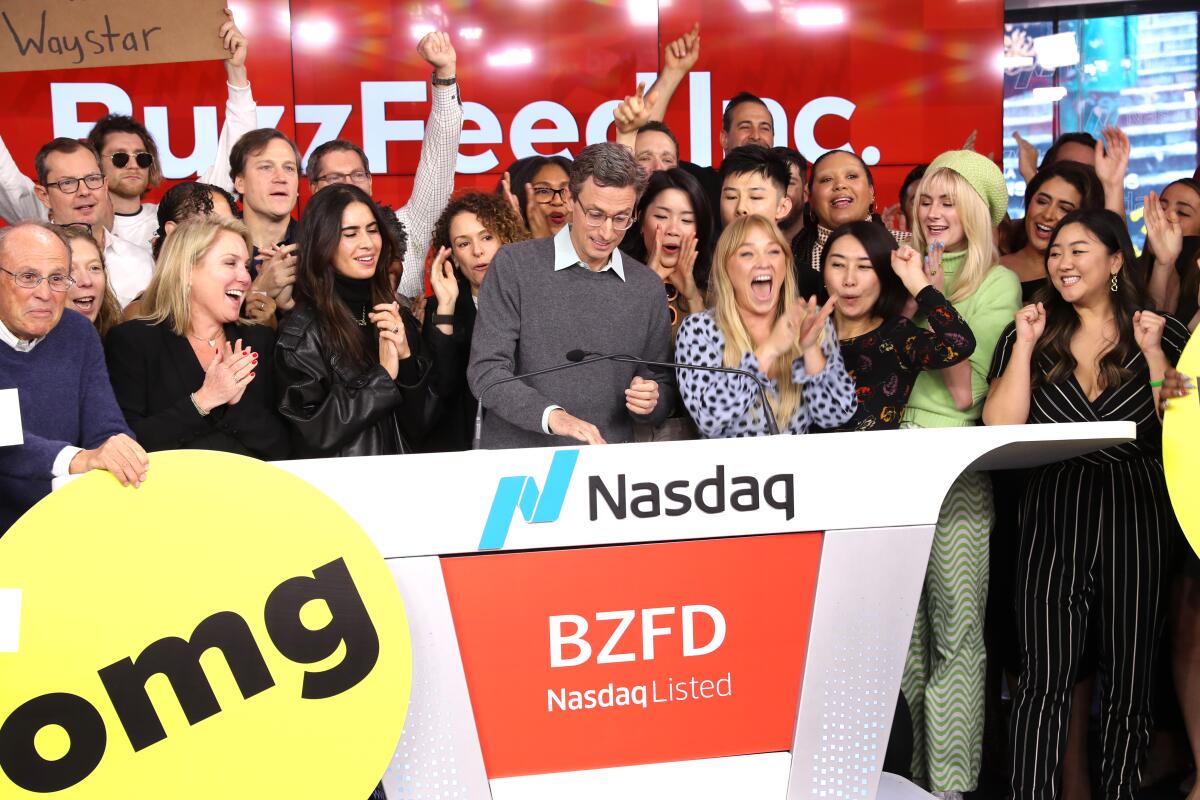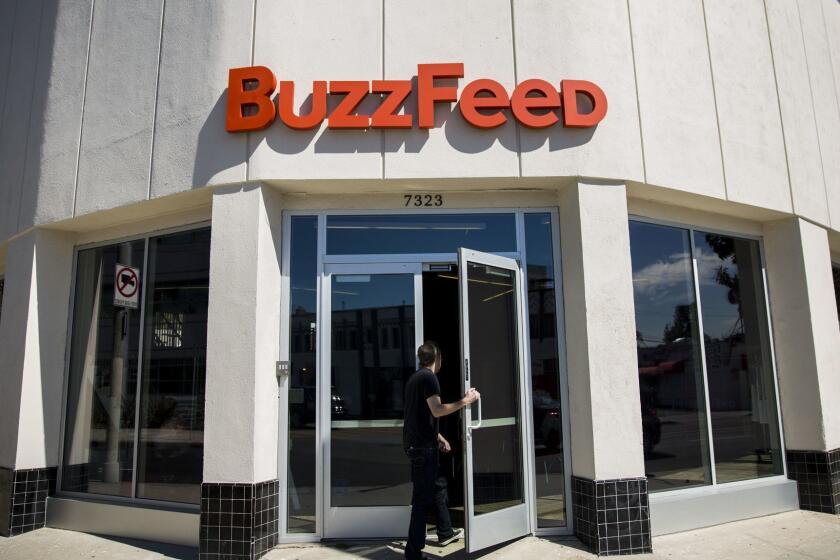BuzzFeed News shutting down as company cuts staff. Journalists ‘heartsick’

- Share via
BuzzFeed News, which won a Pulitzer Prize for its reporting in 2021, is shutting down, in the latest sign of the economic challenges facing digital media companies attempting to deliver serious journalism and create sustainable businesses.
A memo from BuzzFeed chief executive and co-founder Jonah Peretti announced the closure of the once formidable newsgathering unit Thursday. Peretti also said the New York-based media company is cutting 15% of its staff.
“While layoffs are occurring across nearly every division, we’ve determined that the company can no longer continue to fund BuzzFeed News as a standalone organization,” Peretti said.
BuzzFeed was once the belle of the digital ball, with investors lining up and traditional outlets trying to imitate its addictive formula for creating content that appealed to younger consumers who were wedded to Facebook and Twitter, rather than TV and newspapers.
But a slowdown in ad spending, combined with the already challenging task of monetizing digital content, has led to a reckoning for the companies that once looked ready to create a new world order in the media landscape.
From Vice News to Vox Media, the brash new entrants that emerged in the 2000s have scaled back or sought buyers in order to stay afloat.
The outlets — which attracted huge investments from media giants like NBCUniversal and Walt Disney Co. — have failed to live up to their initial promise of replacing established sources of news.
Insider, a digital outlet founded in the 2000s as a resource for finance and business news, on Thursday told employees that it would be cutting 10% of its workforce after investing heavily in its newsroom staff.
The challenges in online news are mounting as analysts and executives across the media industry — including in film and television — have been increasingly questioning whether the money generated from digital distribution methods will be able to match the profitable business models of the analog past.
“I’m heartsick personally,” said Ben Smith, who once ran BuzzFeed News and now is editor in chief of digital startup Semafor. “I do think it marks the end of the marriage between news and social media.”
BuzzFeed’s dive into hard news represented an effort to bring text-based journalism into the modern age.
While BuzzFeed made its name with easy-to-digest lists and viral videos — it could draw more viewers than CNN with a Facebook Live presentation of an exploding watermelon — it became a serious player in journalism with BuzzFeed News, which once had as many as 250 employees.
BuzzFeed News earned a Pulitzer Prize in 2021 for a series of stories exposing China’s vast infrastructure for detaining hundreds of thousands of Muslims in its Xinjiang region.
The outlet also won several prestigious George Polk Awards, including for reporting how Facebook facilitated, then failed to control, disinformation spreading through its users’ accounts, leading to violence.
But the division took heat for publishing an infamous dossier containing unflattering and largely uncorroborated information about then-President Trump in 2017.
The so-called Steele dossier had been circulating among political reporters in Washington, who were unable to verify much of its contents. BuzzFeed was denounced by many journalism experts at the time for its decision.
Attention and acclaim did not make the division profitable. Economic pressures had been taking a toll on the news operation as cutbacks in recent years shrunk the unit to a team of about 50.
When it debuted in 2006, BuzzFeed quickly became a social media sensation.
The shutdown sent shock waves through what was left of the BuzzFeed newsroom.
“It is dizzying that they built this incredible institution — it consistently punched way above its weight — and then they just destroyed it in a heartbeat,” said one ex-BuzzFeed staffer who requested anonymity to speak candidly about their former employer.
BuzzFeed was founded in 2006 and its news division launched in 2012. It was among the early successful online-only media sites, following a model established by Huffington Post, which BuzzFeed would later acquire.
BuzzFeed’s style was edgier and aimed at a younger demographic of digital natives with content that was designed to get traction on social media. Before long, the company built itself into a global media company providing coverage of politics, business and investigations.
Online news sites have suffered in part because major social media companies, including Facebook, changed their algorithms, and have given less focus to news publishers. Facebook’s thinking is that its users would prefer to consume articles shared by friends. Elon Musk’s takeover of Twitter has made that site less hospitable to news publishers as well.
Peretti acknowledged the shift in his memo.
“Over the next couple of months, we will work together to run a more agile and focused business organization with the capacity to bring in more revenue,” Peretti wrote.
He put much of the blame on himself and his misjudgment of the market for news on social media. He said the company would continue to publish news through its less social-media-oriented HuffPost unit, which it agreed to buy in 2020 from Verizon Media.
Peretti said some roles at the company, including at HuffPost, would be open to current BuzzFeed News staffers.
“I made the decision to over-invest in BuzzFeed News because I love their work and mission so much,” he said. “This made me slow to accept that the big platforms wouldn’t provide the distribution or financial support required to support premium, free journalism purpose-built for social media.”
BuzzFeed went public in 2021 through a special-purpose acquisition company, at the time a popular vehicle for firms to raise money and list their shares. Investors, including NBCUniversal, pushed for the listing in order to recoup some of their investment, according to the insiders.
Last year, CNBC reported that investors were pressuring Peretti to shut down BuzzFeed News because it consistently lost money. CNBC reported that shutting down the news operation would add up to $300 million of market capitalization to the struggling stock.
BuzzFeed’s stock closed at 75 cents Thursday, down 20%.
“The IPO was a disaster — it just cannibalized the newsroom,” said one former employee. “The stock tanked, then tanked some more.”
Susan DeCarava, president of the NewsGuild of New York, which represents the BuzzFeed News employees, blasted the company for the shutdown.
“There are real-life consequences when management favors short-term returns over long-term investments,” DeCarava said in a statement. “That’s why we fight hard for contracts that provide protections and support for workers unfairly left holding the bag from a company’s questionable decisions.”
More to Read
Inside the business of entertainment
The Wide Shot brings you news, analysis and insights on everything from streaming wars to production — and what it all means for the future.
You may occasionally receive promotional content from the Los Angeles Times.













